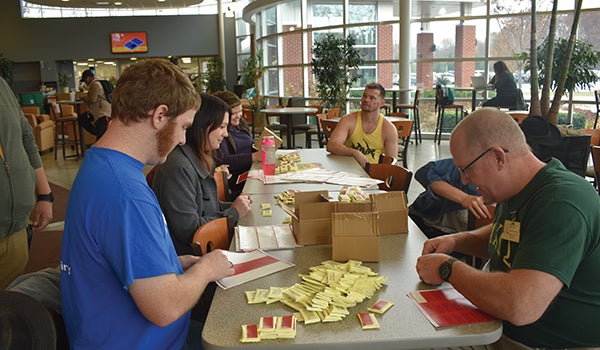SMC students, faculty help spread trafficking awareness
Published 8:42 am Thursday, November 21, 2019
DOWAGIAC — Gathered around a table in the student activity center, a small group of Southwestern Michigan College faculty and students sat around several boxes filled with individually wrapped bars of soap. Their yellow packaging read “good day” in English, French and Spanish.
Each time a bar of soap was picked up it received a new bright red label. On the label read the National Human Trafficking Hotline’s phone number, 1 (888) 373-7888.
As the volunteers at SMC labeled the soap, they were working to help put a stop to human trafficking in their community and help save possible missing children through the help of the SOAP Project, crafted by Theresa Flores, a human trafficking survivor. SOAP stands for Save our Adolescents from Prostitution. Volunteers inspired by Flores’ talks in the area, donated to the SOAP project and received a case of soaps to label. The soaps will be used at upcoming SOAP outreach events.
An actual bar of soap is used because a majority of trafficking occurs in hotels and motels, according to the SOAP project’s website. Once the bars of soap are labeled, trained volunteers from the SOAP project can offer the item free-of-charge to motels along with training on how to identify and report sex trafficking.
At the labeling afternoon, more than 1,000 bars of soap were labeled with the red band. The label asks the holder of the bar of soap if they are being forced to do anything they don’t want to do, if they are being threatened if they try to leave or if they have witnessed young girls being prostituted.
Sitting at the table was Jeff Whittaker, an adjunct faculty member at SMC and pastor of Michiana Christian Embassy church in Niles, who is also active in the Southwest Michigan Human Trafficking Task Force.
At a luncheon hosted at the church in September, Flores, who is also an author and advocate, shared messages of how human trafficking can take place in plain sight. She also spoke at SMC.
At the series, Flores shared the story of how she moved to Birmingham, Michigan and was approached by a man in a black Trans Am. After accepting a ride home one day, Flores was offered a soda that had been drugged.
“He had pictures of her and with three friends standing there. They said, ‘We are going to destroy you and your family if you don’t do everything we say,’” Whittaker said of Flores’ talk.
Several months a year, Flores would sneak out of her house and was abused.
“One day she was drugged and left for dead in a hotel room,” Whittaker said. “She staggered against the drugs and went into a 24-hour late night diner and this tough-minded waitress called the police.”
Whittaker said Flores’ family loved her and offered their support.
On Flores’ worst night, she was auctioned off to more than a dozen men in a Detroit motel. A bar of soap was the only item that would have offered her support, according to the SOAP project’s website. Through Flores’ survival, the SOAP project was born.
Whittaker would like to see Flores speak in other areas of southwest Michigan.
“We are working on bringing this woman back to the area in the spring,” he said. “To get her into Edwardsburg, Niles and Brandywine.”
At the luncheon Flores spoke at, Whittaker said professionals resonated with the presentation, not because they have experience with being trafficked necessarily, but because they have nieces, daughters and sons, too.
Throughout the labeling afternoon, faculty and students stopped by to lend a helping hand.
“As we say in my bible study group, it’s kind of like NASCAR,” Whittaker said. “Even if you can only be there for a couple of minutes, at least come in and get some new tires and go back to class.”







